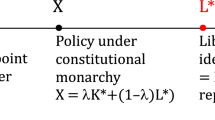Abstract
Fluctuations of protectionism are explained in a model with a political support-maximizing government and a small group of pro-protectionist producers. Due to elections, the government changes the level of protection, though there are no variations in preferences for protection.
Similar content being viewed by others
References
Becker, G. S. "A Theory of Competition among Pressure Groups for Political Influence,"Quarterly Journal of Economics, 98, 3, 1983, pp. 371–400.
Bohara, A. K.; Kaempfer, W. H. "Testing the Endogeneity of Tariff Policy in the U.S.,"Economics Letters, 35, 3, 1991, pp. 311–5.
Cassing, J.; Hillman, A. L. "Shifting Comparative Advantage and Senescent Industry Collapse,"American Economic Review, 76, 3, 1986, pp. 516–23.
Cassing, J.; McKeown, T. J.; Ochs, J. "The Political Economy of the Tariff Cycle,"American Political Science Review, 80, 3, 1986, pp. 843–62.
Dougan, W. R. "Tariffs and the Economic Theory of Regulation,"Research in Law and Economics, 6, 1984, pp. 187–210.
Feichtinger, G.; Hartl, R. F.Optimale Kontrolle ökonomischer Prozesse, Berlin, Germany: de Gruyter, 1986.
Fiorina, M. P. "Economic Retrospective Voting in American National Elections: A Micro-Analysis,"American Journal of Political Science, 22, 2, 1978, pp. 426–43.
__Retrospective Voting in American National Elections, New Haven, MA: Yale University Press, 1981.
Hibbs, D. A. Jr. "On the Demand for Economic Outcomes: Macroeconomic Outcomes and Mass Political Support in the United States, Great Britain, and Germany,"Journal of Politics, 44, 2, 1982, pp. 426–62.
Hillman, A. L. "Declining Industries and Political-Support Protectionist Motives,"American Economic Review, 72, 5, 1982, pp. 1180–7.
Kinder, D. R.; Kiewiet, D. R. "Economic Discontent and Political Behavior: The Role of Personal Grievances and Collective Economic Judgements in Congressional Voting,"American Journal of Political Science, 23, 3, 1979, pp. 495–527.
Magee, Stephen P.; Young, L. "Endogenous Protection in the United States, 1900–1984," in Robert M. Stern, ed.,U.S. Trade Policies in a Changing World Economy, Cambridge, MA: MIT Press, 1987, pp. 145–95.
Nannestad, P.; Paldam, M. "The VP-Function: A Survey of the Literature on Vote and Popularity Functions after 25 Years,"Public Choice, 79, 3–4, 1994, pp. 213–45.
Olson, M.The Logic of Collective Action, Cambridge, MA: Harvard University Press, 1965.
Stigler, G. "Economic Competition and Political Competition,"Public Choice, 13, 1, 1972, pp. 91–106.
Takacs, W. E. "Pressures for Protectionism: An Empirical Analysis,"Economic Inquiry, 19, 1981, pp. 687–93.
Tosini, S. C.; Tower, E. "The Textile Bill of 1985: The Determinants of Congressional Voting Patterns,"Public Choice, 54, 1, 1987, pp. 19–25.
Author information
Authors and Affiliations
Rights and permissions
About this article
Cite this article
Sieg, G. Theory of protectionism fluctuations caused by a support-maximizing government. Atlantic Economic Journal 23, 304–309 (1995). https://doi.org/10.1007/BF02298766
Issue Date:
DOI: https://doi.org/10.1007/BF02298766




